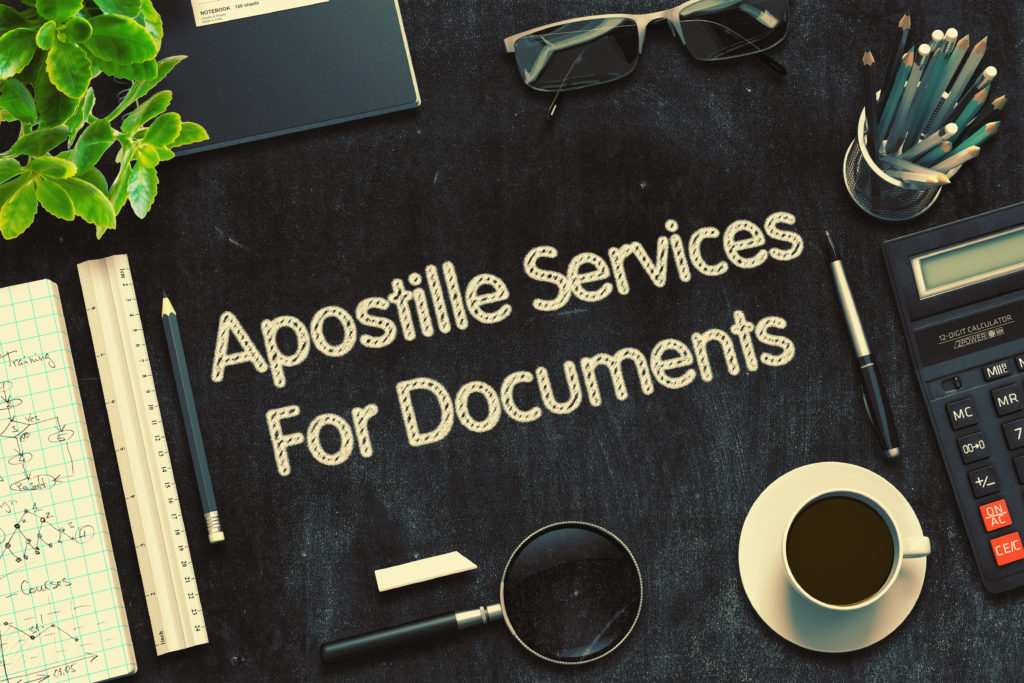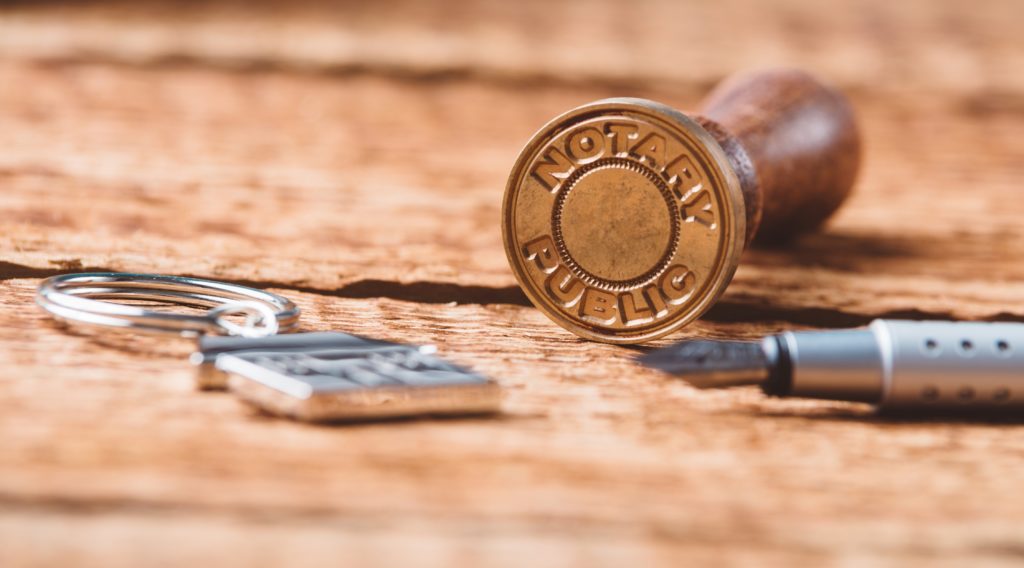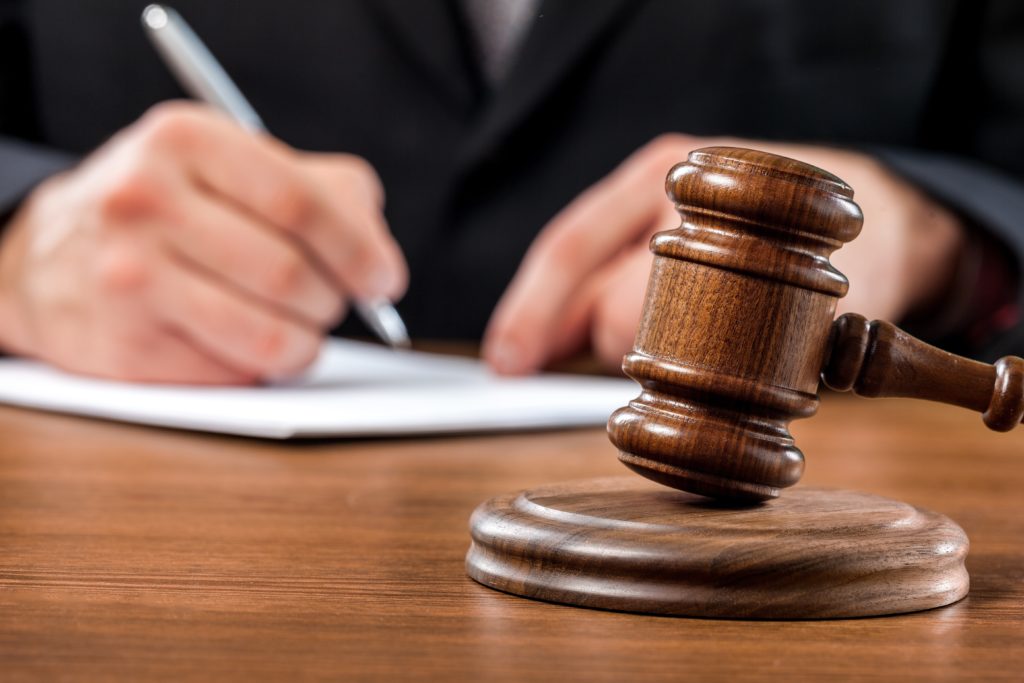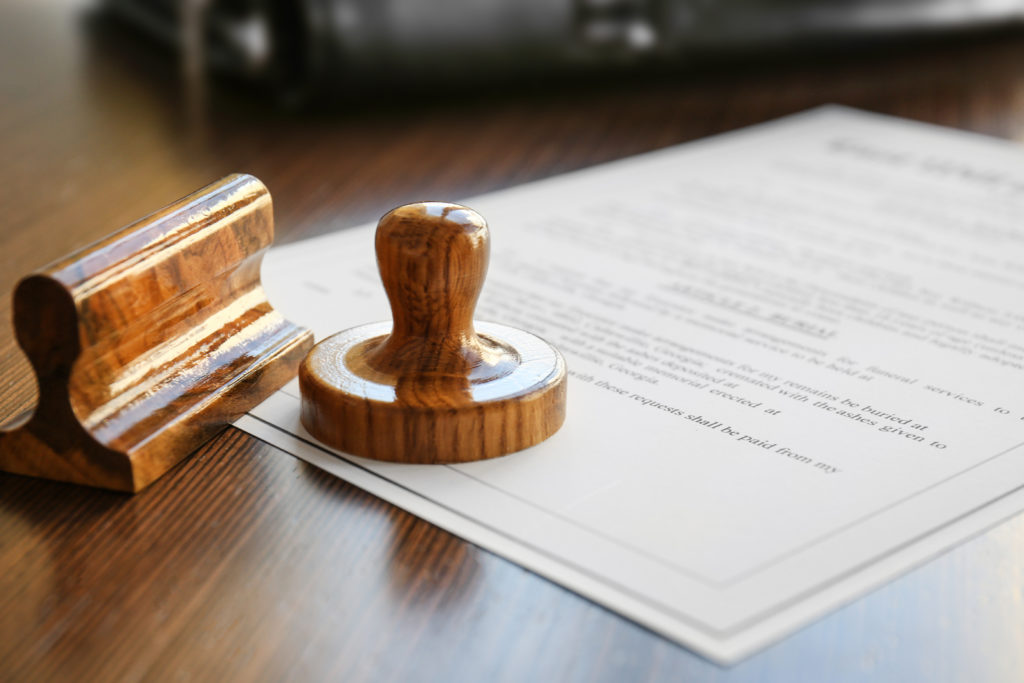Basic business and personal matters often require loads of paperwork. Now and again, you may find yourself in need of an “apostille”. What does that mean, exactly? How do you get one? What is required? Unfortunately, dealing with paperwork can sometimes be a black hole of confusion. When paperwork deals with international law, it gets even trickier. However, you shouldn’t need an advanced law degree to understand and correctly file paperwork. In this article, we are going to answer all your questions about an apostille.
Apostille Meaning
First of all, an apostille is not to be confused with any biblical references to an “apostle”. In fact, an apostille is not a person at all, but a document used in international law. An apostille is usually one page and is included in documents of great importance, or legal priority. This certificate (apostille) confirms that the document has been notarized by an official representative of the state. A proper apostille certificate will include a notary signature and stamp.
The foundational element of the apostille certificate is that it authenticates a document in several countries. Namely, countries that participate in the Hague Convention.
Hague Convention of 1961
In 1961, the Hague Conference on Private International Law drafted what we know today as the “Hague Convention”. The full moniker of this particular law is “The Hague Convention Abolishing the Requirement of Legalisation for Foreign Public Documents”. Which, in so many words, says it all about what the law pertains to. Additionally, this piece of international law is also referred to as the “Apostille Treaty” or “Apostille Convention”.
In short, the Hague Convention streamlines the acceptance of documents as authentic across international borders. A certification (the apostille!) confirms that a document drafted in a country that abides by the Hague Convention will be accepted in other countries that are members of the convention.
Before the Hague Convention, authenticated documents across international borders was a long and tedious process. Now, when working within the members of the convention, authentication is more streamlined than ever.
Hague Convention Countries
Currently, 116 counties are members of the Hague Convention. Over the years, more countries have joined the convention. For example, the United States did not sign on until 1981. If you are in need of an apostille, here is the full list of countries in the Hague Convention.
What Documents Require an Apostille?
Documents needing an apostille vary greatly from country to country. However, here are some of the common documents:
- Birth certificates
- Marriage certificates
- Death certificates
- College degrees
- Academic transcripts
- Job certifications
- Distributorship agreements
- Deeds of assignment
- Adoption papers
- Articles of incorporation
… to name a few. More often than not, simple trips abroad for pleasure will not require documents to be apostilled. However, something more permanent is another story.
When do I need an Apostille?
Perhaps a more thorough approach to debunking apostille needs is providing some scenarios where they may be required. You will likely need an apostille if you are:
- Getting married overseas – Namely, if you are getting married in a country in which you are not a resident
- Living and/or Working Abroad – This is a very common example affecting traveling university students and working professionals, to name a few
- Buying/selling a house in another country – Real estate transactions are seldom simple in your home country. Naturally, they are a bit more complicated when dealing in another country
- Conducting business – This is a broad example. Consider international trade or outsourcing products or services
The above examples nearly skim the surface. There are 195 different countries in the world. These countries all vary widely when it comes to international rules and regulations. Therefore, if you are curious if you need an apostille, do some research specific to your country and situation.
Apostille vs. Notarization
An apostille and a notarization serve different purposes. However, an apostille is not complete without a notarization. A document must be notarized in order to receive official apostille documentation. A notarization, on the other hand, does not need an apostille to be valid.
The primary difference is that an apostille is required for documents meant to cross international borders. Whereas a notarization is intended for use within the United States. Apostilles are only officially recognized when completed and received by their destination country. That is to say, an apostille is not valid in the country in which it was issued – they are intended for use abroad.
Define Notary
To be thorough, let’s take a step back and talk about notarization. In the United States, countless documents require notarization. When this need arises, an official representative of the secretary of state, or a notary public, will get the job done. The notary will act as an unbias witness to the signing of documents of great importance. Additionally, a notary will confirm the identity of the signers to be true and authentic. This seemingly simple act aids in the prevention of fraud. Finally, the notary will confirm that all parties signing the document understand the document in full, and are signing at their own free will.
It is vital to understand that a notary cannot act as an attorney. It is illegal for a notary to give legal advice regarding the contents of the document they are notarizing. Therefore, if you have any lingering questions involving the details of your document, be sure to consult your lawyer.
Apostille vs. Authentication
It is vital to understand that not all counties formally accept documents bearing an apostille. Remember the Hague Convention of 1961 mentioned earlier in this article? Over 50% of the world’s countries have signed over the years. The countries that are a member of the Hague Convention accept apostilles.
The other half of the world not involved in the Hague Convention requires an authentication for international verification. Depending on the country, you may need up to five different authentication documents. To make matters more cumbersome, these authentications all come from different agencies.
Either way, both apostilles and authentication certificates serve the same purpose. Both officially validate a notarized document for use in a foreign country.
More on Authentication Certificates
As previously mentioned, getting a document authenticated for international use is a lengthy and arduous process. Depending on the country, you may need to get up to five separate authentication certificates. You will typically get these from the U.S. Department of State, your destination country’s consulate, and perhaps another government agency from the country you are traveling to. Acquiring all the appropriate authentication certificates is also called legalization.
To submit a document for authentication, you must include all necessary signatures on an original document. Additionally, any document submitted in a foreign language requires a notarization in English.
Furthermore, the requirements and processing times may vary depending on the country you are submitting your authentication.
The Apostille Process
First and foremost, give yourself plenty of time to acquire your apostille. It should come as no surprise that the wheels of international law move slowly. Every U.S. state, as well as every receiving country, have different rules and regulations. Translation: you may get halfway through the process and learn your destination country has different requirements than you were working on. Some typical best practices:
- Originals only – Ensure that your document is original and complete. Copies are unacceptable. In the event that amendments have been made, be sure to include them chronologically for review
- Translations – In the event that your document is in a foreign language, you will likely require the services of a legalized sworn translator
- Non-U.S. Countries – Does your document originate from a non-U.S. country, with a non-U.S. country of destination? If so, give yourself even more time. In these situations, the rules are even more specific – sometimes even requiring a specific type of paper be used
- Identification – More often than not, a passport is the ideal form of identification for apostilles. However, some states/countries require drivers licenses or the like. Check with your local authorities about what form of identification is required
Ultimately, do not skimp on your due diligence. Be sure to check with your local secretary of state’s office about your outgoing requirements. Furthermore, do your research on your destination country. Errors are often made on both ends of apostille transactions.
Time-Saving Tips
With so many different factors involving apostilles, the process can undoubtedly get confusing. Here are some helpful tips on where to start:
- Destination country – Where is your document going? Your first step is to figure out if your destination country is a member of the Hague Convention. If it is, you only need to acquire an apostille. If not, you will need several forms of authentication
- State of origin – If your country of document origin is the U.S., be sure you get your document notarized in the appropriate state. For example, if you were born in California and need an apostille for your birth certificate, you need to have it notarized in California
- Type of document – To make matters even more confusing, the process and necessary requirements can vary based on what type of document you have. To demonstrate, all Federal documents require an apostille from the U.S. Department of State, as opposed to a state office.
- Date of the document – Even documents like birth certificates require new certifications every now and again. Check with your local offices to determine the length of authenticity for your specific document
At the end of the day, every situation is different. Give yourself the time to determine the appropriate steps and requirements.
Where to Find Apostille Services
If you are in the United States, begin your search for an apostille at your local Secretary of State’s office. You must provide the following information:
- What type of document you are authenticating
- Where said document originated
- The destination of the document
Providing this information will help streamline the apostille process. After you submit the above information, the document itself, and the appropriate fees, the secretary of states office will take a few days to process your request. Finally, you will receive your document back with the illustrious apostille stamp. Finally, you will send your apostilled document to its destination country.
Apostille Stamp
The jewel on an official apostille is the stamp. These stamps, or seals, vary widely in appearance depending on the state or country of origin. These seals are almost all circles. Some are simple stamps, while some are gold or red foil stickers. One common element amongst apostille stamps is the presence of the state or country of origin.
Where to Find a Notary
It is important to note that a notary cannot provide an apostille. Therefore, you must visit a notary before the Secretary of State’s office. With over 4 million notaries in America, finding a notary near you should be no trouble. Some places to look are:
- Local Banks – If you are an account holding member of a bigger bank (such as Bank of America) you likely qualify for a free or low-cost notary. Additionally, smaller banks and local credit unions typically offer notary services to everybody at little to no cost
- Universities – Students and faculty can usually get notary services at their college or university
- Insurance or Real estate offices – Look to your local businesses for a notary
- Car dealerships – Many car dealerships provide notaries on site
- Your place of work! – If you work for a larger company, there is a good chance someone in your office is a notary! Many bigger companies keep a notary on staff because they require their services so often
- Mobile Notaries – If you are in a pinch, you can even have a notary come to you! The picture of ease, mobile notaries save your most valuable asset: time. However, they come with a higher price tag, as you have to account for their travel
Keep in mind that notaries are officials of the state. Therefore, their duty is to serve the people. That is to say, if you are not a client/customer at the above locations, they cannot refuse your request for notarization services if they provide them.
How Much is a Notary?
Notarization prices vary greatly depending on where you source them. Notarizations are priced on a per-signature basis. Better yet, most states have a legal cap on how much a notary can charge. For example, in the state of California, a notary cannot charge more than $10 per signature. However, they can add additional fees when applicable. For instance, a mobile notary charging for travel time.
Be sure to check what the average price is in your area. It is incredibly easy to become a notary, and people charging too much may be an indication of notary fraud.
How Much is an Apostille?
The price of an apostille from the Secretary of State is roughly $15 per copy. In matters pertaining to adoptions, the fee is usually around $10. Additionally, you must also consider the costs leading up to this transaction. For example, you may be required to purchase a certified copy of your document. This is common when dealing with marriage or birth certificates. Finally, you must pay to get the document notarized before requesting the apostille.
Apostille Abuse
Like a notarization, an apostille certificate does not authenticate or certify the material within the document at hand. Instead, the apostille certificate authenticates the signature(s) on the document and confirms the validity of the apostille seal.
Sadly, we live in a time where fraud is commonplace. We have all heard of fake i.d.’s, right? Well, there are also illegal counterfeit apostille certificates and stamps out there. Due to the fact that an apostille does not certify the contents of a document, these fake certifications have the ability to make fraudulent documents seem official. Whether you are trying to get an apostille, or are representing a country reviewing one, it is vital you ensure the validity of the document. Be sure to double check with the originating states Secretary of State’s office to confirm they have the document on file. If you suspect fraud, be sure to report it to the proper authorities.
Furthermore, nearly fifty years after the Hague Convention originated, the Hague Conference proposed an amendment. In February of 2009, the convention changed the official apostille wording. Now, most apostille documents will state “this apostille only certifies the signature, the capacity of the signer and the seal or stamp it bears. It does not certify the content of the document for which it was issued.”
Apostille: In Conclusion
In matters of international law, there are several hoops you have to jump through. This legal obstacle course often takes time and patience. Anything that requires the transfer and acceptance of a document across international borders will require either an apostille certificate or a series of authentications. The deciding factor is whether or not your destination country is a member of the Hague Convention. Every U.S. state and foreign country has different rules and regulations. Take the time to research your destination, and check with your local secretary of state to find out your particular requirements.
Sources
https://www.judgmentbuy.com/ExemplifiedVSCertified.html
http://www.businessdictionary.com/definition/apostille.html
https://en.wikipedia.org/wiki/Apostille_Convention
http://sccoclerk.com/CountyClerkHome/TheApostilleProcess.aspx
https://www.notarypublicstamps.com/articles/everything-a-notary-must-know-about-an-apostille/
https://www.nationalnotary.org/notary-bulletin/blog/2015/07/notary-basics-understanding-apostilles




